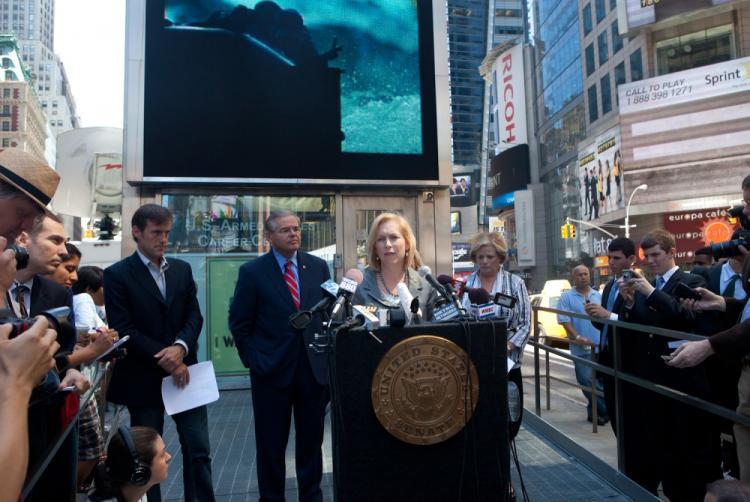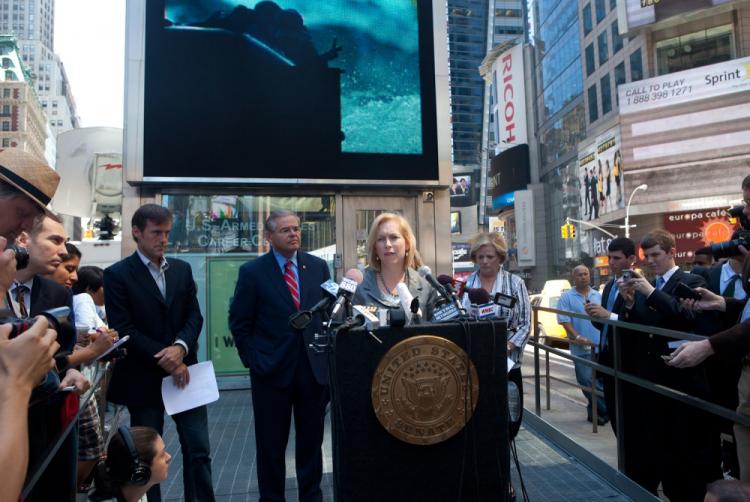NEW YORK—The release of the Lockerbie bomber by Scottish authorities last year may have been motivated by BP’s interests in drilling in Libya, according to U.S. officials who spoke in New York City on Monday. The U.S. officials are demanding that British and Scottish officials answer questions about the allegations regarding the release of the Libyan man who killed 270 people by blowing up Pan-Am Flight 103 in 1988.
“This is supposedly our strongest ally in our fight against terrorism. And they have completely betrayed us, betrayed the victims, and betrayed all the people who worked for dozen of years to try to bring some modicum of justice to this horrible act,” said Brian Flynn, who lost his brother in the bombing, at Times Square on Monday.
Alongside bombing victims’ families, U.S. Sens. Robert Menendez (D-N.J.) and Kirsten Gillibrand (D-N.Y.) urged British and Scottish officials to testify at the Senate Foreign Relations Committee hearing this Thursday regarding the release of Abdelbaset Ali al-Megrahi, the man convicted for the terrorist attack.
“The abundance of incredible coincidences surrounding al-Megrahi’s release deserves a real, open, transparent hearing. Full information regarding the most dubious aspects of a decision to release him should be made public,” said Menendez.
Sen. Menendez is heading the Senate hearing scheduled for July 29.
On Aug. 20, 2009, al-Megrahi was released on “compassionate grounds” after doctors determined that he only had three months to live as his health had deteriorated from cancer. But as he is still alive today 11 months after his release, allegations have surfaced that he may have been released in exchange for a deal with BP to drill in Libya, where there are lucrative oil reserves.
A copy of a letter from British House of Lords member, Lord Trefgarne, to the Scottish Cabinet Secretary for Justice Kenny MacAskill, was revealed at the press conference. In the letter, dated July 17, 2009, Lord Trefgarne, who is also chairman of the Libyan British Business Council (LBBC), a group representing British business interests in Libya of which BP is also a member, warned MacAskill of the “serious implications for U.K.-Libyan relations” should al-Megrahi die in prison.
Contents of the letter was previously reported back in September 2009 by The Times, a U.K. newspaper, but the evidence holds particular significance now after BP admitted this month that they indeed lobbied to the British government for a prison transfer agreement. In 2007, Sir Mark Allen, a former MI6 agent who by then worked for BP as a consultant, made two phone calls to then-British justice secretary, Jack Straw. During talks with Libya, Straw worked to exclude al-Megrahi from a $900 million deal with the country to drill there, reported The Times in September.
However, Straw was unable to do so and thus wrote to MacAskill, “In view of the overwhelming interests for the United Kingdom I have agreed that in this instance the PTA [prison transfer agreement] should be in the standard form and not mention any individual.”
At the press conference on Monday, Senator Menendez said that both Allen and BP CEO, Tony Hayward were asked to testify at the Senate hearing on Thursday. Straw, MacAskill, and the Scottish Prison Service’s medical chief, Andrew Fraser, were also invited to appear at the hearing, according to a report by the AP. MacAskill and Fraser declined the invitation, while Straw said he had not yet received an official request, but made the following remark: “It is in my experience highly unusual for the Legislature of one sovereign state to conduct an inquiry into decisions of another sovereign state.”
BP spokesman, Mark Salt said that Hayward had received the invitation and that he was “considering it,” reported the AP.
Sen. Menendez emphasized that even if Hayward may be stepping down as CEO, he will not be exempt from the Senate’s request for his participation in the investigation. “Considering that BP is responsible for what has happened in the Gulf, and that this hearing is to help ensure justice, and the murder of 189 Americans, 38 from my home state of New Jersey, should BP choose to avoid this hearing, I don’t think it will be taken kindly by the American people.”
He urged British and Scottish officials to reconsider their silence and cooperate with the Senate. “I certainly understand that they don’t feel compelled to give answers to a foreign government. They are not bound to do so and maybe that is not a common practice, but this is not a common case either.”
Furthermore, he expressed that the hearing was vital to ensuring “fundamental justice” for the families of the bombing victims, as well as to national security, “so that no would-be terrorist can look at this case and think they too, can kill scores of Americans and get away with it.”
Sen. Gillibrand was also present at the press conference. She said, “What has happened here is an entire miscarriage of justice. Al-Megrahi should have never been released.” She pointed out that newly gathered evidence has raised concerns that “there may have been fraud in the evidence presented to allow for a compassionate release.”
She also noted that she and other senators were able to speak with British prime minister, David Cameron, during his visit to the United States last week. She noted that Cameron said “a full investigation is not off the table, and in fact, he is beginning a full document review.” In light of BP’s announcement this weekend that they would go ahead with drilling in Libya, she said that there should be a moratorium on drilling in the area until the investigation on the Lockerbie bombing is closed.
Mary Kay Stratis, who lost her husband in the bombing, said, “The lack of cooperation that we’re getting from across the pond is to me, indicative that there are questions that need to be answered and things are being hidden. We need to bring them to light.”
“This is supposedly our strongest ally in our fight against terrorism. And they have completely betrayed us, betrayed the victims, and betrayed all the people who worked for dozen of years to try to bring some modicum of justice to this horrible act,” said Brian Flynn, who lost his brother in the bombing, at Times Square on Monday.
Alongside bombing victims’ families, U.S. Sens. Robert Menendez (D-N.J.) and Kirsten Gillibrand (D-N.Y.) urged British and Scottish officials to testify at the Senate Foreign Relations Committee hearing this Thursday regarding the release of Abdelbaset Ali al-Megrahi, the man convicted for the terrorist attack.
“The abundance of incredible coincidences surrounding al-Megrahi’s release deserves a real, open, transparent hearing. Full information regarding the most dubious aspects of a decision to release him should be made public,” said Menendez.
Sen. Menendez is heading the Senate hearing scheduled for July 29.
On Aug. 20, 2009, al-Megrahi was released on “compassionate grounds” after doctors determined that he only had three months to live as his health had deteriorated from cancer. But as he is still alive today 11 months after his release, allegations have surfaced that he may have been released in exchange for a deal with BP to drill in Libya, where there are lucrative oil reserves.
A copy of a letter from British House of Lords member, Lord Trefgarne, to the Scottish Cabinet Secretary for Justice Kenny MacAskill, was revealed at the press conference. In the letter, dated July 17, 2009, Lord Trefgarne, who is also chairman of the Libyan British Business Council (LBBC), a group representing British business interests in Libya of which BP is also a member, warned MacAskill of the “serious implications for U.K.-Libyan relations” should al-Megrahi die in prison.
Contents of the letter was previously reported back in September 2009 by The Times, a U.K. newspaper, but the evidence holds particular significance now after BP admitted this month that they indeed lobbied to the British government for a prison transfer agreement. In 2007, Sir Mark Allen, a former MI6 agent who by then worked for BP as a consultant, made two phone calls to then-British justice secretary, Jack Straw. During talks with Libya, Straw worked to exclude al-Megrahi from a $900 million deal with the country to drill there, reported The Times in September.
However, Straw was unable to do so and thus wrote to MacAskill, “In view of the overwhelming interests for the United Kingdom I have agreed that in this instance the PTA [prison transfer agreement] should be in the standard form and not mention any individual.”
At the press conference on Monday, Senator Menendez said that both Allen and BP CEO, Tony Hayward were asked to testify at the Senate hearing on Thursday. Straw, MacAskill, and the Scottish Prison Service’s medical chief, Andrew Fraser, were also invited to appear at the hearing, according to a report by the AP. MacAskill and Fraser declined the invitation, while Straw said he had not yet received an official request, but made the following remark: “It is in my experience highly unusual for the Legislature of one sovereign state to conduct an inquiry into decisions of another sovereign state.”
BP spokesman, Mark Salt said that Hayward had received the invitation and that he was “considering it,” reported the AP.
Sen. Menendez emphasized that even if Hayward may be stepping down as CEO, he will not be exempt from the Senate’s request for his participation in the investigation. “Considering that BP is responsible for what has happened in the Gulf, and that this hearing is to help ensure justice, and the murder of 189 Americans, 38 from my home state of New Jersey, should BP choose to avoid this hearing, I don’t think it will be taken kindly by the American people.”
He urged British and Scottish officials to reconsider their silence and cooperate with the Senate. “I certainly understand that they don’t feel compelled to give answers to a foreign government. They are not bound to do so and maybe that is not a common practice, but this is not a common case either.”
Furthermore, he expressed that the hearing was vital to ensuring “fundamental justice” for the families of the bombing victims, as well as to national security, “so that no would-be terrorist can look at this case and think they too, can kill scores of Americans and get away with it.”
Sen. Gillibrand was also present at the press conference. She said, “What has happened here is an entire miscarriage of justice. Al-Megrahi should have never been released.” She pointed out that newly gathered evidence has raised concerns that “there may have been fraud in the evidence presented to allow for a compassionate release.”
She also noted that she and other senators were able to speak with British prime minister, David Cameron, during his visit to the United States last week. She noted that Cameron said “a full investigation is not off the table, and in fact, he is beginning a full document review.” In light of BP’s announcement this weekend that they would go ahead with drilling in Libya, she said that there should be a moratorium on drilling in the area until the investigation on the Lockerbie bombing is closed.
Mary Kay Stratis, who lost her husband in the bombing, said, “The lack of cooperation that we’re getting from across the pond is to me, indicative that there are questions that need to be answered and things are being hidden. We need to bring them to light.”







